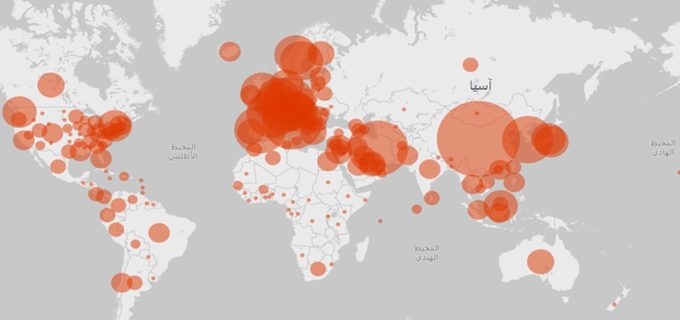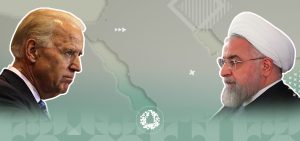Three months after its appearance in China last December, Covid-19 turned from a crisis specific to China, into a global pandemic, according to the World Health Organization on March 11. Before it was classified as a pandemic, Covid-19 had manifested across the globe, in all countries bar 22; and as of April 4, it had caused the death of nearly sixty thousand (58,929) and with more than one million and one hundred thousand cases (1,100,283), with the numbers rising by the minute. The number of deaths is expected to reach hundreds of thousands before any treatment is attained.
The pandemic has brought about a global paralysis in various economic and navigational sectors, halting normal education and closing all places of worship.
Reasons for the cause of the virus vary, and its transmission from China to Western countries has revealed vulnerabilities and imbalances in governments’ spending in the health sector. Meanwhile, analysts are predicting that the global system, led by the US, is changing due to the rise of international powers contesting its leadership.
This assessment of the situation examines the geography of the epidemic’s spread and the weaknesses it has demonstrated. It will also endeavour to explore its temporal range in light of the scientific efforts to reach a treatment / vaccine, in addition to the economic and political implications.
Contextualization of the spread of the virus and tit-for-tat allegations
At the height of the unprecedented scientific developments achieved by developed countries and the ongoing competition between them, after many attempts to conceal and deny, China acknowledged – due to the high number of victims – the presence of Covid-19 in the economically important city of Wuhan. Wuhan is the centre for scientific research laboratories and attracts many American scientists, especially in the fields of medicine, where many experiments in genetics and cloning are conducted.
At the beginning of the virus’s emergence in the Chinese city of Wuhan, tit-for-tat allegations arose between Chinese and US officials and the media of the two countries. There emerged many narratives based on conspiracy theories. Some theories narrated that the virus was a conspiracy targeting China’s economy, reputation and prestige, given its high annual growth rates. Other theories attacked Chinese people’s eating of wild animals where viruses flourish, as well as it allegedly being a result of China’s development of biological weapons. Other narrations link the emergence of the virus to the controversy surrounding expenditures on the elderly and contractors and their impact on budgets and living sectors in general, especially in western countries, and that the spread of the virus aimed to reduce the proportion of the elderly and reduce costs.
Religious people, for their part, saw in it a divine punishment as a result of the spread of immorality, reminding humanity of the power of God and the necessity for repentance.
With the range of explanations for the spread of the virus and its development into a pandemic, it can be said that, generally, viruses are indeed abundant in some creatures and in the environment surrounding humans and in laboratories. Viruses – including the coronavirus – appear and spread within the following two possibilities: the transmission of the virus to humans by a living organism, either through consumption or the environment; or, the virus leaks from specialised laboratories, either intentional or through human error.
As for the rapid spread of the virus and its transformation into a global pandemic (due to the mounting number of victims), ultimately this is due to the delay in discovering the virus and taking measures to contain it, whether in China initially, or in other countries that sufficed in checking body temperatures to track it. Moreover, the virulence of the virus itself must be considered, as well as its advent coinciding with the global neglect of the health sector on the one hand, and the increase in crowding in transportations, travel and general mingling on the other hand.
It should be noted that the extent of the spread of the virus varies from one state / region to another within one country. In China for example, cases were concentrated in the city of Wuhan; in the US in New York and in Italy in the northern region. Meanwhile, if the number of cases and fatalities were calculated according to population size, European countries such as Sweden and Italy would top the list, surpassing China, which was the first stop for Covid-19.
Although the number of cases and fatalities of the pandemic is high, there are suspicions surrounding the numbers issued by China, Russia, Iran, Indonesia, North Korea and Egypt. Bloomberg News quoted US officials as saying that China has not revealed the true numbers of deaths and infections related to Covid-19.
China had announced that 3,300 people died, and 82,000 people were infected with Covid-19 since the outbreak in late 2019, compared to more than 189,000 cases and more than 4,000 deaths in the US, where the first case appeared at the end of January, according to Johns Hopkins University.
According to White House estimates on March 31, Covid-19 will kill between 100,000 and 240,000 people in the US if everyone complies with the restrictions currently imposed to contain the epidemic, compared to between 1.5 million and 2.2 million deaths if no restrictions were imposed.
In Italy, the Civil Protection Agency said on April 1 that the number of deaths caused by Covid-19 had increased to 13,155, after increasing by 727 in the preceding 24 hours.
The French Ministry of Health recorded 4,861 new infections, bringing the total number to 56,989, while the number of deaths exceeded 4,000.
In Turkey, the Minister of Health, Fakhruddin Kuja, announced that the number of deaths due to Covid-19 reached 277, and the total number of cases rose to 15,679.
In the UK, the Ministry of Health announced 563 new deaths as a result of Covid-19, bringing the total number of deaths to 2,352, with the total number of cases reaching 29,474.
As for countries of the Arab region, the number of fatalities is still considerably low. According to statistics from Al-Jazeera Net, the Saudi Ministry of Health on April 1 recorded six new deaths from Covid-19, and 157 new cases, bringing the total number of cases to 1,720.
The Egyptian Ministry of Health announced 99 new cases, bringing the total to 779, with six new deaths recorded, bringing the total to 52.
The Algerian Press Service reported 130 new cases, bringing the total to 847, while the total number of deaths rose to 58.
Meanwhile, the UAE recorded 150 new cases, bringing the total to 814, while the number of deaths rose to eight.
In Doha, the Qatari Ministry of Health announced 54 new cases of Covid-19, bringing the total number of cases to 835.
In Oman, authorities placed the district of Muttrah under quarantine as of April 1 until further notice in its confrontation with Covid-19. Oman also announced it will take other precautionary measures.
In Kuwait, the Ministry of Health announced 28 new cases of Covid-19, bringing the total number to 317 cases.
A table showing the number of Covid-19 cases and fatalities in countries with the most cases as of midday, April 4, 2020:
| Country | No. of cases | No. of fatalities |
| USA | 277,457 | 7,137 |
| Italy | 119,827 | 14,681 |
| Spain | 119,199 | 11,198 |
| Germany | 91,159 | 1,275 |
| China | 82,526 | 3,330 |
| France | 64,338 | 6,507 |
| Iran | 53,183 | 3,294 |
| UK | 38,168 | 3,605 |
| Turkey | 20,921 | 425 |
| Switzerland | 19,606 | 591 |
| Belgium | 16,770 | 1,143 |
| Netherlands | 15,725 | 1,487 |
| Canada | 12,545 | 188 |
| Austria | 11,524 | 168 |
| South Korea | 10,156 | 177 |
Source: BBC
Number of cases of Covid-19 in the Middle East and North Africa
April 1, 13:00 GMT | Cases: 75,081 | Fatalities: 3,506
1 to 100
101 to 500
501 to 1000
More than 1000
| No. of cases | No. of fatalities | No. of cases | No. of fatalities | ||
| Iran | 47,593 | 3,036 | Lebanon | 479 | 12 |
| Turkey | 13,531 | 214 | Tunisia | 394 | 10 |
| Israel | 5,591 | 21 | Kuwait | 317 | 0 |
| Saudi Arabia | 1,563 | 10 | Jordan | 274 | 5 |
| Qatar | 781 | 2 | Oman | 210 | 1 |
| Algeria | 716 | 44 | Afghanistan | 196 | 4 |
| Egypt | 710 | 46 | West Bank & Gaza | 134 | 1 |
| Iraq | 694 | 50 | Syria | 10 | 2 |
| UAE | 664 | 6 | Libya | 10 | 0 |
| Morocco | 638 | 36 | Sudan | 7 | 2 |
| Bahrain | 569 | 4 |
Source: Johns Hopkins, IRNA news and BBC at 13:00 GMT, April 1.
Upon reviewing the spread of the virus geographically and its victims, the bulk of the cases are evident in western countries, with scarcity in East Asian countries despite their population density and the similarity of their eating habits with the Chinese. This may be due to the authorities keeping discreet about the actual number of cases, or it may be due to the lack of diagnostic equipment, or the limited number of elderly people in the population, who are more vulnerable to infection. Countries that have not reported any cases of the virus are all classified as developing or unsuccessful.
Scientific attempts to develop a vaccine
Many scientific centres are racing against time to develop a vaccine for Covid-19, and because of the proliferation of fatalities, some governments have approved the conduction of vaccine clinical trials directly on humans. It is estimated that treatments will be available by the end of this year or next year; because this is a long period, countries are focussing on implementing preventive measures.
On Thursday, March 19, 2020, US President Donald Trump announced that the US had “approved” the use of Chloroquine – an anti-malarial drug – to treat people infected with the coronavirus.
After several countries worldwide widened its access to malaria drugs to treat patients infected with the coronavirus, the European Medicines Agency warned against such use, except in “clinical trials or in a national emergency”.
In order to accelerate the discovery of a cure, a New York Times report stated that dealing with Covid-19 had changed some of the priorities and constraints of work in research centres, such as not registering scientific discoveries in the name of the party making the discovery. Moreover, centres and institutions are publishing their studies on the virus through the internet months before the scientific journals they were to be published in are actually published. Researchers have identified hundreds of genetic sequences of the virus and have shared it with other scientists; and more than 200 clinical trials were launched in joint efforts between hospitals and laboratories worldwide.
Implications of the Covid-19 pandemic
The pandemic has caused damage in various sectors: economic, health, political, social, and even moral. Several countries pirated medical supplies intended for others, and have prioritised their citizens over residents in medical and living services. The pandemic has caused near-total paralysis to many sectors as a result of the precautionary measures imposed, primarily quarantine, as well as the closure of many countries of their borders and stopping air traffic.
The most prominent damage was in shares, as the market value of companies’ shares fell, as did oil prices, which fell to less than $20 a barrel.
The stock performance indicators FTSE, Dow Jones and Nikkei witnessed massive declines since the start of the pandemic on December 31. Recently, the Dow Jones and FTSE indices achieved their biggest one-day drop since 1987.
The BBC warned that the global economy will experience its largest decline in growth since the 2009 financial crisis, according to the Organisation for Economic Co-operation and Development (OECD).
It also reported that the outbreak of Covid-19, “for a longer and more intense period”, could reduce global growth to 1.5% in 2020 as a result of factories suspending their activities and workers remaining at home in an attempt to contain the virus.
In anticipation of the prolonged period of the pandemic, Saudi Arabia requested that Muslims wait before they make their plans for Pilgrimage (Hajj) this year. It also apologised for not being able to hold the G20 summit in Saudi Arabia this year, calling instead for it to be convened virtually. Further to indications of the prolongation of the crisis, the Olympic Games, which were scheduled to take place in Japan between July 24 and August 9, were postponed. Furthermore, the Expo 2020 Dubai Steering Committee in the UAE recommended that the world fair be postponed for a year, instead of it being held between October 2020 and April 2021.
The economic repercussions were exacerbated by the compounding spread of Covid-19 with the sharp decline in oil prices due to increased supply and declining demand. The latter was as a result of the competition for market shares between Saudi Arabia and Russia on the one hand, and an attempt to pressure US high-cost shale oil on the other.
In response to repercussions of the pandemic, central banks in many countries decided to cut interest rates to encourage borrowing, and then to encourage spending, in order to stimulate the economy. US President Donald Trump signed a $2 trillion economic bailout bill to lend a hand to large and small companies that have been affected by the shutdowns due to the spread of the virus.
Investors fear that the Covid-19 pandemic will destroy economic growth, and that government measures will not be enough to stop the downturn.
The health sector
Experts expect that the virus will continue to spread for several months, and that its victims will continue to increase – reaching one million fatalities – before the preventive measures; personal, institutional and scientific efforts succeed in combating it and developing a cure. This would come after proving the efficacy of vaccines that are currently being worked on in scientific centres worldwide, and where many clinical trials are underway.
In this regard, it is expected that governments and the private sector will re-evaluate their spending priorities, and will restore spending on the health sector as a priority to encourage scientific research and the development of health services.
Food crisis
The French news agency, AFP, on April 1 quoted managers of two UN and World Trade Organisation agencies warning of the risk of a “food shortage” in the global market due to turmoil in international trade and food supply chains in the wake of Covid-19.
“Uncertainty about food availability can spark a wave of export restrictions, creating a shortage on the global market,” said the joint text signed by Qu Dongyu, head of the UN Food and Agriculture Organization (FAO), Tedros Adhanom Ghebreyesus, director-general of the World Health Organization (WHO) and Roberto Azevedo, director of the World Trade Organisation (WTO).
International relations and world order
Covid-19 will be considered a milestone for events that suddenly appear, and the making of swift significant changes in the balances of international powers, their priorities, and their interrelationships. It also revealed the imbalance of determinants upon which the assumptions of progressive studies are based, and which assume the growth of phenomena in their regular form, whether they are imbalanced in some respects, and with the destruction or growth of sources of power and position in other aspects.
Many thinkers went to the assertion that the world after Covid-19 will not be the same, predicting a decline in the power of the US – which has lead the global system for nearly a third of a century (specifically from the 1990s) – and inferring that it is going through a state of isolation in President Donald Trump’s term, which may be renewed for another four years.
There is no doubt that the world is going through what appears to be an accelerating stage of transition, the outputs of which depend on the ability of countries to deal with them. However, they appear to be weakening the influence of Western powers in the countries of the East, which may begin re-evaluating their interrelationships and their own needs.
While acknowledging the rise of international powers such as China, Germany and India; and the return of Russia; and Turkey’s attempt to play a greater role; talk about the decline of the role of the US and the failure of the capitalist model in which progression was expected to take place may be premature. This is so especially since the major countries that seek to compete with the US – led by China – still lack a political model and civilisational values that can be disseminated and applied; because essentially, these countries without economic growth do not constitute a desired model.
Conclusion
It seems that Covid-19’s economic repercussions and greater political and security repercussions will be for the Arab countries, including the Gulf oil states. This is because the central power’s control will weaken before the less powerful states, instigating conflicts over wealth and energy sources, and forcing the Gulf states to stop, or reduce, the assistance they provide to some other countries, especially Egypt.
These expected repercussions require that governments initiate several steps of reform, particularly political and societal reforms. Demonstrating their desire for reforms will be essential in order to develop their relations with their peoples. They would also need to ensure that their people understand their economic reforms and cooperate in facing internal and external security challenges.







